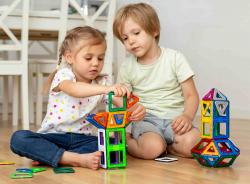Unplug and Play: Benefits of Board Games in Different Player Scenarios
Family bonding is an essential aspect of a happy and healthy home. One of the best ways to strengthen family ties is through the magic of board games! Not only do they provide hours of entertainment and laughter, but they also offer valuable opportunities for skill development.
Let's dive into the wonderful universe of board games and discover the countless benefits they offer!
Benefits of Board Games for Family Bonding
Board games go beyond just entertaining your loved ones; they actively contribute to family bonding in delightful ways.
Enhancing Communication and Interaction
Board games are the perfect icebreakers, encouraging active participation and engagement from everyone involved. Whether it's rolling dice, playing cards, or moving tokens on a game board, every turn requires players to communicate and strategize. Such interactive play fosters a sense of togetherness and makes for some unforgettable moments.
-
Active Participation and Engagement: Board games draw everyone into the action, encouraging every family member to participate actively. Whether you're rolling dice, strategizing, or making crucial decisions, each player has a role, and that keeps everyone engaged throughout the game.
-
Cooperative Gameplay: Many board games, like cooperative ones, require players to work together towards a common goal. Such games foster teamwork and collaboration, allowing family members to bond while solving challenges as a united front.
-
Facilitating Conversations: Board games create the perfect environment for conversations to flow effortlessly. As players interact, they share laughter, stories, and experiences, which promotes open communication and strengthens family ties.
Strengthening Relationships
Board games provide an avenue for creating shared experiences that will be cherished for years to come. The sense of camaraderie and teamwork that emerges during these games helps build stronger relationships among family members.
-
Creating Shared Experiences: Board games create lasting memories as families share unique and enjoyable experiences. These shared moments become cherished stories that bind family members together even tighter.
-
Promoting Teamwork and Collaboration: Whether you're building alliances or strategizing with your team, board games teach valuable lessons in teamwork and collaboration. These skills translate into better relationships in everyday life.
-
Building Trust and Empathy: In competitive games, players experience wins and losses. Learning to accept defeat graciously and celebrate others' victories fosters empathy and understanding among family members, ultimately building trust within the family unit.
Promoting Quality Time and Fun
In the age of digital distractions, board games offer a refreshing alternative that brings the family together without screens. They provide endless fun for all ages and ensure quality time well spent.
-
Reducing Screen Time: Board games offer a fantastic alternative to screen time. Engaging in analog entertainment allows families to disconnect from devices and connect with each other, creating a refreshing change of pace.
-
Creating Memorable Moments: The joy of family game nights leaves a lasting impression on children and adults alike. These memories become an integral part of family traditions, passed down through generations.
-
Providing Entertainment for All Ages: Board games come in various themes and difficulty levels, making it easy to find games suitable for all ages. From little ones to grandparents, everyone can join in the fun, ensuring inclusive and entertaining family gatherings.
Benefits of Board Games for Skill Development
Board games are not only fun, but they are also powerful tools for skill development, nurturing a wide range of abilities in players of all ages.
Cognitive Development
Board games challenge the mind, stimulating cognitive abilities and honing essential thinking skills that are valuable in various aspects of life.
-
Critical Thinking and Problem Solving: Board games often present players with challenging situations that require critical thinking and problem-solving skills to overcome. Analyzing options, evaluating consequences, and making informed decisions become second nature through gameplay.
-
Decision-Making Skills: As players face various choices during a game, they learn to make decisions swiftly and effectively. These decision-making skills carry over to real-life situations, benefiting both children and adults.
-
Strategic Planning and Foresight: Many board games involve strategic planning and anticipating opponents' moves. Developing foresight helps players plan ahead, enhancing their ability to think strategically in different scenarios.
Social and Emotional Development
Board games offer a safe and controlled environment for children to learn valuable social and emotional skills that are essential for healthy relationships and personal growth.
-
Learning to Take Turns and Practice Patience: Board games teach valuable life skills like taking turns and waiting patiently for others. These simple acts instill patience and consideration for others' needs.
-
Managing Emotions and Handling Competition: Board games offer a safe space for players to experience emotions like excitement, frustration, and joy. Learning to manage these emotions in a healthy way is a crucial aspect of emotional development.
-
Developing Sportsmanship and Resilience: Winning and losing are both parts of any game. Board games teach the importance of good sportsmanship and resilience, helping players cope with disappointments and celebrate achievements gracefully.
Communication and Language Skills
Board games encourage verbal interaction and promote the development of language skills, including vocabulary, expression, and comprehension.
-
Expressing Ideas and Opinions: In board games that involve negotiation or storytelling, players learn to express their ideas and opinions clearly. This fosters effective communication skills, aiding in self-expression and assertiveness.
-
Enhancing Vocabulary and Language Fluency: Certain word-based board games can improve vocabulary and language fluency. Players learn new words and phrases while having fun, making the learning process enjoyable.
-
Improving Listening and Comprehension Skills: Active listening is a vital skill in board games where rules and strategies are discussed. Players enhance their comprehension abilities by paying attention to details and understanding the game mechanics.
Numeracy and Logical Reasoning
Board games frequently incorporate numerical elements, fostering numerical literacy and logical reasoning skills.
-
Counting, Adding, and Subtracting: Many board games involve counting, adding, and subtracting numbers. These mathematical elements subtly reinforce numeracy skills, making learning math an enjoyable experience.
-
Developing Pattern Recognition: Some games challenge players to recognize and analyze patterns, improving logical reasoning abilities. This cognitive skill extends beyond games and proves useful in various academic and real-life scenarios.
-
Enhancing Logical Reasoning and Problem Solving: Logic-based board games encourage players to solve puzzles and riddles, honing their logical reasoning and problem-solving prowess.
Board Games for Different Age Groups:
Board games for different age groups provide engaging and age-appropriate experiences, ensuring that everyone in the family can enjoy the excitement and benefits of gameplay.
Board Games for Young Children:
Young children thrive on games that are easy to understand and enjoyable. Look for board games with simple rules and gameplay that capture their imagination and hold their attention. Many board games for this age group also offer educational and skill-building elements, making learning a fun and engaging experience.
-
Simple Rules and Gameplay: Games like "Candy Land," "Snakes and Ladders," and " Webby World Map Jigsaw Puzzle " are perfect for young children, as they have straightforward rules and require minimal reading or counting.
-
Educational and skill-building options: "Guess Who?" and " Wooden Shut The Box" not only entertains but also promote memory, color recognition, and fine motor skills.
-
Popular board games for young children: " Shumee Peppa Pig Carnival Memory Game " and " Paw Patrol On The Treasure Hunt " are just a couple of the many beloved board games for young kids, featuring their favorite characters from popular movies and TV shows.
Board Games for Teenagers:
Teenagers crave challenges and excitement. Look for board games that offer strategic depth and engaging gameplay to captivate their interest. Whether they prefer cooperative or competitive experiences, there's a board game to match their tastes.
-
Engaging and Challenging Options: Games like " Webby Holy City Varanasi Wooden Jigsaw Puzzle," " Mattel Uno Flip," and " Plot 4 Board Game " provide complex strategies and decision-making opportunities that keep teenagers entertained.
-
Cooperative and Competitive Games: " Ratnas Decode The Top Secret Word" and "Betrayal at Baldur's Gate" are fantastic examples of games that encourage collaboration or pit players against each other in thrilling scenarios.
-
Popular Board Games for Teenagers: "Exploding Kittens," "Splendor," and "Dixit" are some of the most loved board games among teenagers, offering diverse and engaging gameplay.
Board Games for Adults:
For adults, board games are an opportunity to challenge their minds and share laughter with friends and family. These games often involve intricate strategies and captivating narratives.
-
Complex strategy games: Games like "Sequil," "Spin to Win," and " Stock Market " cater to the strategic minds of adults, offering deep gameplay and numerous possibilities.
-
Party and social games: " Gold Plated Poker Playing Cards " " Crossword Letters Board Game " and " Backlash " are perfect choices for gatherings, sparking laughter and fostering social connections.
Selecting and Playing Board Games:
By carefully considering factors like age appropriateness, complexity, and player preferences, families can select board games that guarantee an entertaining and rewarding experience for all participants.
Factors to Consider When Selecting Board Games:
Choosing the right board game depends on several factors, such as the age of the players, game duration, and complexity. Considering the interests and preferences of the players ensures an enjoyable experience for everyone.
-
Age appropriateness: Select games that match the age and maturity level of the players to ensure they can fully engage with the gameplay and rules.
-
Game duration and complexity: Consider the length of time you have for gameplay and the complexity of the rules. Shorter, simpler games work well for quick gaming sessions, while longer, more intricate games are suitable for dedicated gaming nights.
-
Player preferences and interests: Take into account the interests and preferences of the players. If your family enjoys strategy and competition, go for games that offer deep decision-making and tactical challenges. On the other hand, if you prefer light-hearted fun, opt for party games that encourage laughter and interaction.
Tips for a Successful Board Game Night:
Organizing a board game night that everyone will enjoy involves setting the right atmosphere and expectations.
-
Establishing clear rules and expectations: Before starting, ensure everyone understands the rules of the game and knows what to expect during the gameplay. This prevents misunderstandings and keeps the focus on having fun.
-
Creating a comfortable gaming environment: Set up a comfortable space for gaming, with enough seating and good lighting. Snacks and refreshments can add to the enjoyment of the game night.
-
Rotating game selections and involving everyone: Rotate the selection of board games to cater to different interests and preferences. Encourage everyone to participate, regardless of their experience or skill level, fostering a sense of inclusivity and camaraderie.
In conclusion, board games offer an incredible opportunity for family bonding and skill development. They promote communication, teamwork, and problem-solving while providing a break from screens and creating cherished memories. At Toys"R"Us, you'll find a wide range of board games suitable for all ages, ensuring that your family game nights are filled with laughter, excitement, and endless fun. So, gather around the table, roll the dice, and let the board games begin!
With such an exciting array of benefits, it's clear that board games are more than just a source of entertainment. They bring families together, strengthen bonds, and foster skill development in an engaging and enjoyable way. So, the next time you gather around for a family game night, remember the profound impact these seemingly simple board games can have on your loved ones' lives.
Get ready to roll the dice, strategize, and have a blast with the fantastic selection of board games available at Toys"R"Us, designed to create countless memorable moments with your family! Happy gaming!
FAQs:
1. What are some popular board games for families?
Some popular board games for families include classics like Monopoly, Scrabble, Scotland Yard, and Clue.
2. How can board games benefit child development?
Board games help children develop various skills, including critical thinking, problem-solving, decision-making, communication, teamwork, patience, and resilience. They also provide a fun and engaging way to learn and reinforce academic concepts.
3. Are there educational board games available?
Yes, there are numerous educational board games available. These games are designed to teach specific subjects such as math, science, language, and history in an interactive and enjoyable manner.
4. How can families make board game nights a regular activity?
To make board game nights a regular activity, schedule a specific day or evening each week or month dedicated to game night. Involve everyone in the family in selecting games, taking turns choosing the game for each session. Make it a special event by preparing snacks or creating a cozy atmosphere.
 Free Delivery On Orders Over ₹ 999
Free Delivery On Orders Over ₹ 999 Order By 6Pm For Next Day Delivery!
Order By 6Pm For Next Day Delivery!








The information below is required for social login
Sign In
Login
Login With OTP
Login With Email
Verify your phone number
OTP has been sent to
Resend OTP
Or
By continuing, you agree to ToysRus’s Conditions of Use and Privacy Notice.
Create New Account